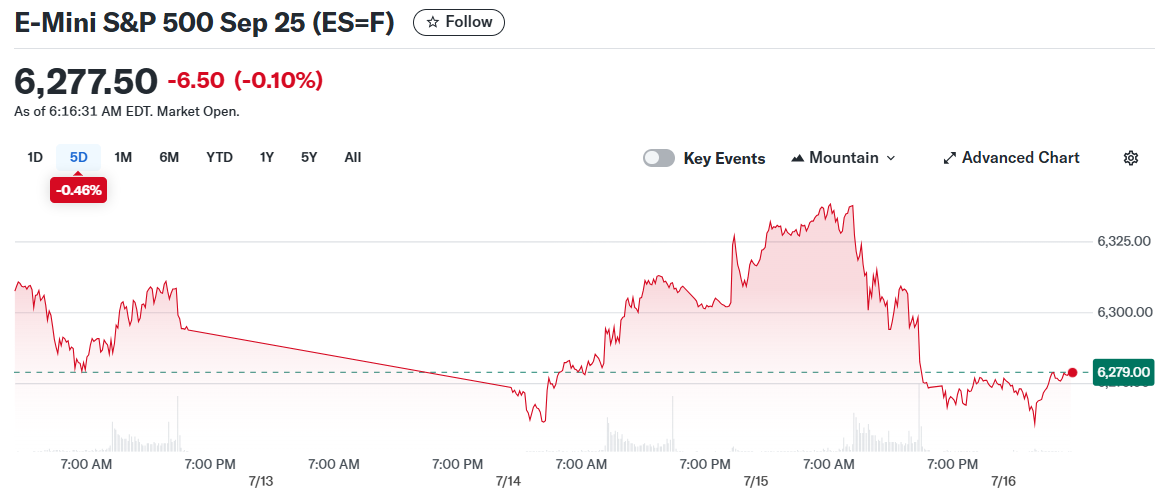TLDR
- Stock futures fell Wednesday morning as inflation fears persisted despite cooler-than-expected consumer price index data
- Core consumer price index showed signs of tariff impact with 0.2% gain in core goods inflation, the fastest increase since February
- Treasury yields continued rising with 10-year yield reaching 4.491% early Wednesday
- Goldman Sachs, Bank of America, and Morgan Stanley earnings reports due alongside producer price index data
- Nasdaq closed at record high Tuesday driven by Nvidia’s 4% gain, but broader market weakness affected 454 of 500 S&P stocks
Stock futures declined Wednesday morning as investors grappled with persistent inflation concerns ahead of key bank earnings and economic data releases. The Nasdaq Composite had closed at a record high Tuesday, but broader market weakness suggested underlying anxiety about economic conditions.
Futures on major indexes showed mixed to negative performance in premarket trading. Dow Jones Industrial Average futures remained broadly flat, while S&P 500 futures dropped 0.1% and Nasdaq 100 futures fell 0.2%.

The tech-heavy Nasdaq’s record close came primarily from Nvidia’s 4% surge Tuesday. However, this masked broader market weakness across other sectors and individual stocks.
Market breadth told a different story than headline indexes. According to Dow Jones Market Data, 454 stocks in the S&P 500 declined while just 48 rose Tuesday, indicating widespread selling pressure beyond the technology sector.
BREAKING: June CPI inflation rises to 2.7%, above expectations of 2.6%.
Core CPI inflation rises to 2.9%, below expectations of 3.0%.
CPI inflation in the US is now up for 2-straight months for the first time since January 2025.
The Fed pause will continue.
— The Kobeissi Letter (@KobeissiLetter) July 15, 2025
Consumer price index data released Tuesday showed core inflation came in lower than expected for June. The annual inflation rate reached 2.7% after consumer prices rose 0.3% for the month, above previous readings.
Despite the cooler headline number, specific data points raised concerns about tariff impacts. Core goods inflation gained 0.2%, marking the fastest one-month increase since February.
Household appliance prices jumped 1.9% in June, representing the largest monthly increase since records began in 1999. Deutsche Bank strategist Jim Reid highlighted this as evidence of tariff effects beginning to filter through the economy.
Bank Earnings and Economic Data
Major financial institutions are set to report earnings Wednesday morning. Goldman Sachs, Bank of America, and Morgan Stanley will release quarterly results, following mixed performances from other large banks earlier in the week.
The producer price index data will also be released Wednesday. This wholesale inflation measure provides insight into price pressures in the supply chain before they reach consumers.
Treasury yields continued their upward trajectory following Tuesday’s inflation data. The 10-year Treasury yield edged up to 4.491% early Wednesday, extending recent gains that reflect investor concerns about persistent price pressures.
Federal Reserve Policy Implications
The inflation data has complicated expectations for Federal Reserve policy moves. Previous hopes for September rate cuts have become less certain as price pressures prove more persistent than anticipated.
Trade policy uncertainty continues to weigh on market sentiment. Ongoing tariff policies and potential escalation of trade measures have created additional volatility in global markets.
Asian markets traded lower overnight, with Korea’s Kospi and Japan’s Nikkei both declining. This weak global performance added to pressure on U.S. futures ahead of Wednesday’s trading session.
Oil prices moved higher, contributing to inflation concerns and adding pressure on corporate margins. The energy sector’s performance often reflects broader economic anxieties about supply chain costs and consumer spending power.
Final Take
If you’re wondering why stocks are down today, it boils down to ongoing inflation concerns and tariff-related price pressures shaking investor confidence. Despite a record Nasdaq close, widespread selling across sectors and rising Treasury yields highlight market anxiety. Key bank earnings and upcoming economic data will be crucial in determining whether these inflation worries persist or ease, directly impacting stock performance and Federal Reserve policy expectations.






